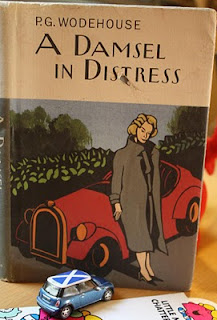According to Wilde, ‘If you want to tell people the truth, make them laugh, otherwise they’ll kill you’.
An Ideal Husband is an 1895, comedic stage play. The action is set in London, in ‘the present’ and takes place over the course of twenty four hours (source: Wikipedia). The play revolves around blackmail, politics, and public honour. It also touches upon the subject of matrimony and what makes a husband, ideal.
Act I opens in the Chiltern household where a banquet of sorts is taking place. It is here that we are introduced to all the major characters; Sir Robert Chiltern, his wife, Lady Chiltern, his dandified friend Lord Goring, Goring’s father Lord Caver sham, Mabel Chiltern, Sir Robert’s younger sister and of course, Mrs. Cheveley.
Mrs. Cheveley is the perfect villain. She is ‘a genius in the daytime and a beauty at night’. Mrs. Cheveley has, in her possession, a letter from Sir Robert’s past which can ruin his public and private life. Everybody has skeletons in their closets and Sir Robert is no exception. The most unfortunate thing, for him, is that not only does the world but his wife, also, has no clue of this horrid letter from his past.
One of the long speeches from Act II is very interesting. Following is an excerpt of an exchange between Sir Robert Chiltern and his wife, Lady Chiltren after the latter found out the dreaded secret from her husband’s past.
“Lady Chiltern: .......And now- oh, when I think that I made of a man like you my ideal! The ideal of my life!
Sir Robert Chiltern: There was your mistake. There was your error. The error all women commit. Why can’t you women love us, faults and all? Why do you place us on monstrous pedestals? We have all feet of clay, women as well as men; but when we men love women, we love them knowing their weaknesses, their follies, their imperfections, love them all the more, it may be, for that reason. It is not the perfect, but the imperfect, who have need of love. It is when we are wounded by our own hands, or by the hands of others, that love should come to cure us – else what use is love at all? All sins, except a sin against itself, Love should forgive. All lives, save loveless lives, true Love should pardon. A man’s love is like that. It is wider, larger, more human than a woman’s. Women think that they are making ideals of men. What they are making if us are false ideals merely.”
I wonder how a feminist reader would react to Sir Robert Chiltern’s speech. Men in our society do expect women to love them with all their faults. But unlike Sir Robert, they can’t stand any imperfection in their wives. One thing is for sure, feminist or not, a woman’s love is much wider and larger than a man’s unless of course, you’re married to the ideal husband!
Two of the most interesting characters in the play are Lord Goring and Mrs. Cheveley. Goring’s character is of a laid back bachelor who enjoys the finer things in life. He is a glorified dandy; a man who pays particular attention to his physical appearance and almost borders on being a narcissist (Oscar Wilde was quite the dandy himself). Following is a little excerpt from Act III where Goring is having a talk with his butler, Phipps.
“Lord Goring: You see, Phipps, Fashion is what one wears oneself. What is unfashionable is what other people wear.
 |
| Wilde - Quite the dandy! |
Phipps: Yes, my lord.
Lord Goring: Just as vulgarity is simply the conduct of other people.
Phipps: Yes, my lord.
Lord Goring: And falsehoods the truths of other people.
Phipps: Yes, my lord.
Lord Goring: Other people are quite dreadful. The only possible society is oneself.
Phipps: Yes, my lord.
Lord Goring: To love oneself is the beginning of a life-long romance, Phipps.”
Modesty, thy name is not Lord Goring.
 |
| Lord Goring corners Mrs. Cheveley |
The hero of the play, for want of a hero figure, is undoubtedly Lord Goring. He has the most charming manners, the wittiest lines, good looks and is the saviour of his friend, Sir Robert Chiltern. It is interesting how, in Act III, Lord Goring manages to corner Mrs. Cheveley and thus, save his friend’s reputation. Lord Goring is not upright or righteous, far from it, but he has an understanding of how an evil mind works. Let’s just say that Lord Goring is street smart and it is this personality trait that helps him to nail Mrs. Cheveley.
The play ends on a happy note. Sir Robert Chiltern and his wife come to terms with the past and the present. Lord Goring also ties the knot in Act IV when he proposes to the younger sister of Sir Robert Chiltern, Mabel Chiltern, and is accepted. Does he make an ideal husband?
“Lord Caver sham (Lord Goring’s father): And if you don’t make this young lady an ideal husband, I’ll cut you off with a shilling.
Mabel Chiltern: An ideal husband! Oh, I don’t think I should like that. It sounds like something in the next world.
Lord Caver sham: What do you want him to be then, dear?
Mable Chiltern: He can be what he chooses. All I want is to be...to be...oh! a real wife to him.”
I wonder...
[A little trivia; The Ideal Husband has several celluloid versions with the latest one being that of 1999 starring Cate Blanchett as Lady Chiltern, Julianne Moore as Mrs. Cheveley, and Rupert Everett as Lord Goring].
Photographs: Google Images





















